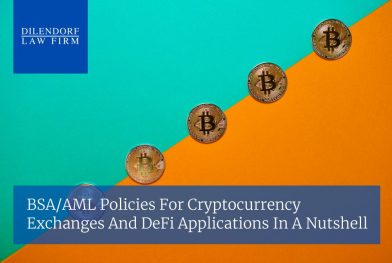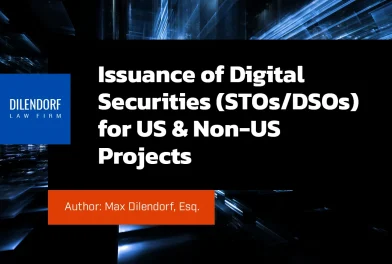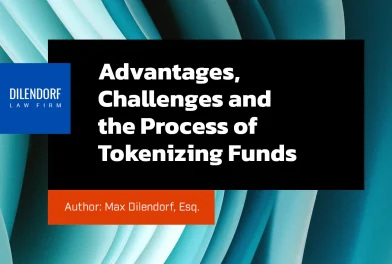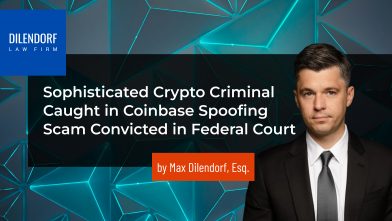Will NFTs be Deemed Securities Subject to the U.S. SEC Laws and Regulations?
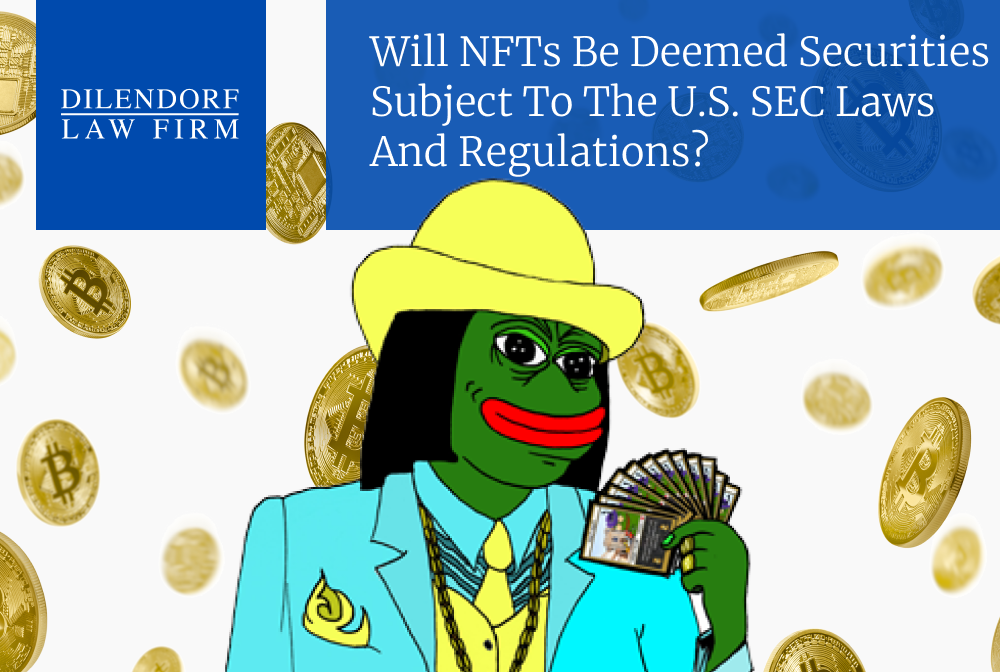
Ever since Christie’s completed its history-making auction of Beeple’s digital artwork, “Everydays: The First 5000 Days”, resulting in a $69.3 million sale, the prospect of getting rich from non-fungible tokens (“NFTs”) has become a hot topic among creators and investors.
Questions are swirling about whether NFTs will eventually be deemed securities by the Securities and Exchange Commission (“SEC”) and become subject to state and federal securities regulations.
The answer to whether NFTs may be treated as securities under U.S. law is maybe – perhaps, not all NFTs will be viewed by the US regulators as securities, but quite possibly certain NFTs indeed will be.
If an NFT is connected to a unique piece of digital art/collectible/gaming prop, effectively serving as a blockchain certificate of authenticity, such NFT is unlikely to be a security. If, however, NFTs are offered to the General Public with a promise of liquidity and continued services of the issuer, increasing the NFT’s value, such NFT may be wrapped in an investment contract and, thus, a security itself.
Regardless of whether the investment community is calling it a genuine NFT, the SEC, courts, as well as the Internal Revenue Service (“IRS”), will look at the economic substance of an investment instrument within a given transaction, rather than its form. As the Supreme Court emphasized in the prominent Howey test for securities, ruling that an investment in orange groves was a security: “Form [is] disregarded for substance and the emphasis [is] placed upon economic reality.” SEC v. W.J. Howey Co., 328 U.S. 293, 298 (1946).
In this landmark decision, the investors purchasing interests in the orange groves in Howey were passive and relied on the developer’s efforts to service the groves, which fit squarely into the purview of an “investment contract” definition adopted in the same Supreme Court decision.
Since Howey, investments in different non-security assets “wrapped” in investment contracts are considered securities, including the textbook cases of whiskey barrel interests, golf, and country club memberships. and in general, other investment instruments in which investors are earning passive income from the efforts of others.
All of these were, effectively, passive investments in a promoter’s enterprise (whether selling whiskey or building a golf club and facilities) with the investor’s participation limited to providing capital with the hope of a favorable return. In the absence or failure of the promoter’s efforts, investors faced a substantial risk of losing the invested funds.
Similarly, despite being marketed as a unique digital asset, some of the NFTs being marketed today have all the glaring features of such “passive investments”.
Knowing that the SEC and that the Securities Act is unchanged, one would assume that the Howey test could just as easily be applied here as it would to any other novel, uncommon, or irregular device, whatever it appears to be, if it is offered or processed as an investment contract.
What features of an NFT could make it a security?
The answer will depend on many factors, including the ones summarized by the Director of the SEC’s Division of Corporate Finance, William H. Hinman, in his speech about fungible tokens with certain consumer value that may or may not be securities. Interestingly, some of the factors emphasized by Director Hinman seem to be equally applicable to NFTs, including the ones outlined below.
The way NFTs are sold. If NFTs are sold to the General Public with the promise of instant liquidity or return, they will resemble a speculative investment more than a digital collectible.
In such a case, NFTs that are not subject to transfer restrictions, in essence are being sold to the General Public with the expectation of a quick return on the passive investment, rather than being sold to experienced collectors of unique blockchain tokens and digital collectibles.
The manner in which NFTs and underlying assets are controlled and promoted. If the issuer of the NFT is creating and influencing the secondary market for NFTs, or providing other services designed to increase the NFTs’ value, the token may be considered a security.
The anticipated profit in such a case would then depend more upon the managerial efforts of the NFT issuer, promoter, or marketplace than on the open market for digital collectibles and other similar NFTs.
As such, the underlying nature of such a transaction looks more like a security than a digital collectible.
Also, NFT projects often attach extensive rights and royalties to the underlying one-of-a-kind asset; even it was created by the user, thus, controlling the asset and its marketing.
If such an NFT project fails, the value of the NFTs issued by the project promoter will likely decrease to zero, regardless of the underlying digital asset’s substance, however unique or non-fungible it is.
This situation appears to resemble club membership cases where the memberships, which were not typically securities, were ultimately called such. This distinction was made because passive investors were risking the loss of funds if the project was unsuccessful.
Despite NFTs’ embedded non-fungible nature, the manner of sale, number of NFT copies, promised value and market conditions substantially dependent on the promoter may turn an NFT collectible investment into a highly regulated security.
Also, NFTs with revenue or royalty sharing features may be securitized and pooled as traditional revenue-generating assets, such as music recordings, raising a slew of related income, trust, and estate tax issues, both for U.S. and non-U.S. investors alike.
Some of the existing NFT projects seem to offer the same features as securities – promising liquidity, controlling the secondary market, and directly influencing the NFTs’ value through their services. Such projects may be at risk for future SEC investigations and enforcement actions.
However, as this is an emerging asset class, and there is currently no bright-line rule or a set of exclusive factors to rely upon in answering the question whether NFTs may be treated as securities, it is important that each NFT project be carefully analyzed to determine if it is subject to the securities regulations, not to mention the myriad of complex tax issues that arise depending how the IRS will view the underlying nature of the particular NFT.
What are the consequences of NFT being a security?
NFTs offered and sold as securities will become subject to certain securities laws and regulations, such as the requirement to register with the SEC as a security.
Registered securities must abide by a different set of regulations, including limitations on marketing and transfer, including airdrops and hard forks. Individuals and entities dealing with the NFT also would need to be registered as broker-dealers.
Additionally, any mislabeled and non-compliant NFT projects may be found in violation of the anti-fraud provisions of securities laws and face civil and criminal penalties if they are found to be misleading investors.
Mislabled NFTs also are likely to cause improper characterization of the asset for U.S. federal income, estate and gift tax purposes, potentially resulting in improper reporting of any income, loss or gain generated from such asset.
NFT platforms, marketplaces and service providers should be particularly cautious about offering NFTs which could potentially be considered securities, so as not to fall within the definition of a broker-dealer under the Securities Exchange Act, or the definition of an investment adviser under the Investment Advisers Act.
FinCEN also sees decentralized (distributed) applications (DApps) as being subject to the same definition as money transmitters, making DApps that accept and transmit value, regardless of whether they operate for profit, subject to the same regulatory interpretation that applies to other money transmitters, which are subject to regulations by every State within the United States. Any of these outcomes would necessitate registration and strict compliance within a stricter regulatory regime.
Similarly, celebrities should be wary of endorsing certain NFT projects, as they may be acting as unregistered brokers or be otherwise liable for participation in an offering or sale of unregistered securities. In the past, Floyd Mayweather Jr. and other celebrities were charged with unlawfully touting ICOs, which the SEC fairly considered to be securities. As described above, this may be the case for certain NFTs as well.
SEC’s Investigation Trends Affecting NFT & Subpoenas
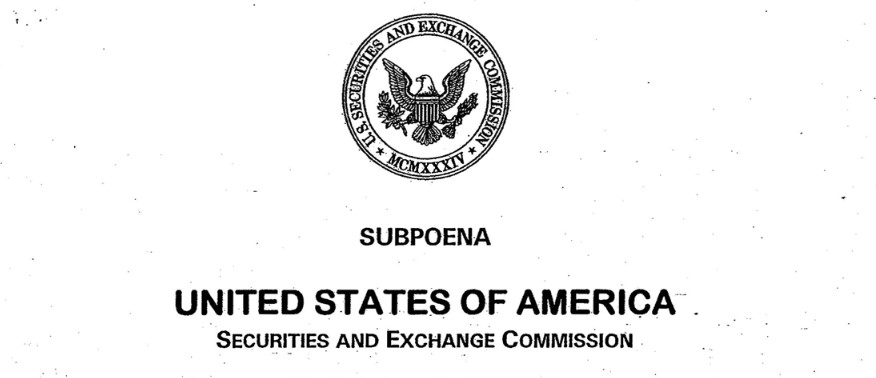
On May 3, 2022, the SEC announced that it will double the size of Enforcement’s Crypto Assets and Cyber Units
Since its creation in 2017, the unit has brought more than 80 enforcement actions related to fraudulent and unregistered crypto asset offerings and platforms, resulting in monetary relief totaling more than $2 billion.
The expanded Crypto Assets and Cyber Unit will focus on investigating securities law violations related to NFTs. First, SEC obtains evidence of possible violations of the securities laws from many sources. With a formal order of investigation, the Division’s staff may compel witnesses by subpoena to testify and produce books, records, and other relevant documents.
SEC may require production of any records deemed relevant or material to the inquiry, including:
- Documents or communications evidencing ownership of NFTs or crypto-related tokens;
- Communications between various members of NFT communities, including Twitter, Telegram, Discord chats, and other social media records;
- Agreements with gaming creators, developers, including platforms like Sandbox, Metaverse;
- Service agreements and communications with any secondary marketplace websites, including platforms like OpenSea, SuperRare, NiftyGateway;
- Documents and communications concerning any payment to third parties, including any gaming developers, marketing agencies and social media influencers;
- Documents or communication concerning sale of NFTs and crypto on any decentralized cryptocurrency exchanges, including but not limited, to Sushiswap, Uniswap; and
- Marketing materials concerning the creation or promotion of NFTs and other crypto tokens.
Contact Information
Max Dilendorf
Dilendorf Law Firm PLLC
85 Broad Street, 27th Floor
New York, NY 10004
T. 212.457.9797
info@dilendorf.com
Co-Authors: Bari Zahn of Zahn Law Group LLP, Top Crypto Tax Law Firm and Gleb Zaslavsky, Esq.
Attorney Advertising. The information presented is not legal advice, is not to be acted on as such, may not be current and is subject to change without notice. You should not act upon any such information without first seeking qualified professional counsel on your specific matter.


